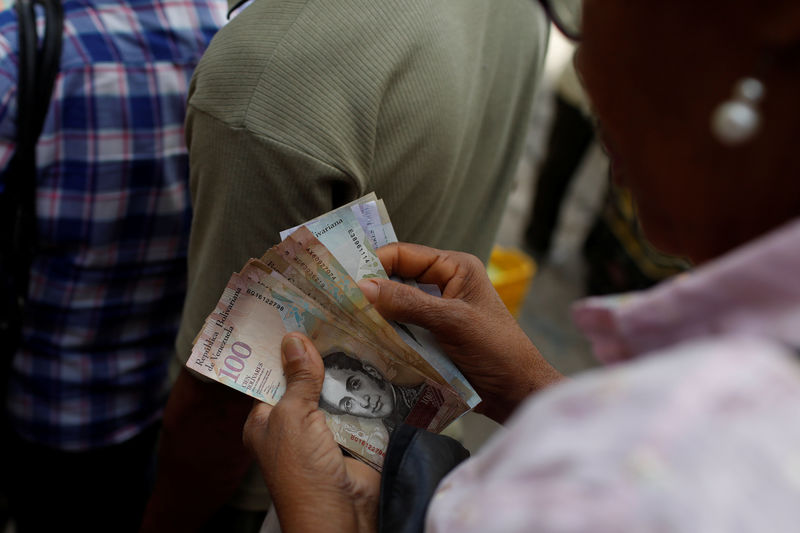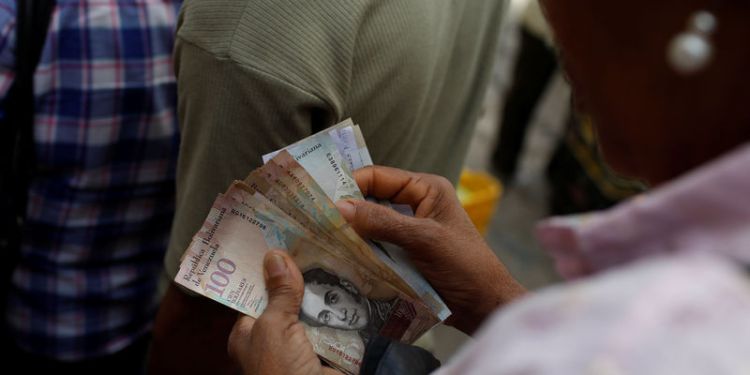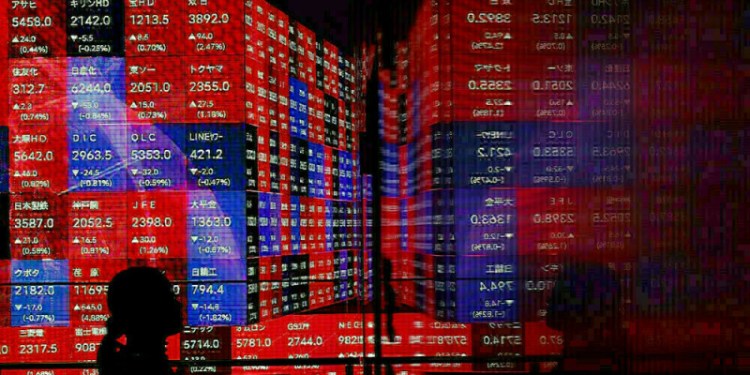 © Reuters. A woman counts Venezuelan bolivar notes at a vegetable street market in Caracas
© Reuters. A woman counts Venezuelan bolivar notes at a vegetable street market in CaracasBy Corina Pons
CARACAS (Reuters) – A small Puerto Rican bank that had been helping Venezuela carry out international trade operations has halted those services because of concerns about the reputational risks of doing so, a finance industry source with knowledge of the situation has told Reuters.
Venezuelan President Nicolas Maduro last year tapped San Juan-based Italbank, a little-known institution, to serve as a financial intermediary for food and medicine imports, after global bank Citigroup Inc (N:) halted certain services and closed an account with Venezuela’s central bank.
Italbank will no longer provide the service known as correspondent banking, the source said, citing several rounds of U.S. sanctions that have further deepened Venezuela’s economic crisis and its struggles to pay its foreign debt.
“Venezuela is in the eye of the storm and … the reputational risk is too high,” said the source, who asked not to be identified.
Italbank’s decision will not affect the payment on the country’s distressed bonds, several of which are already in default because of payment delays, since Italbank was not involved in such operations. But it may make it more difficult for Venezuela to import basic goods.
Italbank, run by Venezuelan entrepreneur Carlos Dorado, declined to comment. Venezuela’s information ministry did not immediately respond to a request for comment.
The bank, which operates under an offshore banking license in Puerto Rico, a U.S. territory, opened in 2008 and says on its website it is focused on the Latin American market. It has a single office in San Juan and largely carries out operations online or by telephone.
U.S. President Donald Trump this year prohibited U.S. banks from buying newly issued Venezuelan debt and barred citizens from meeting with a group of top government officials accused of involvement in human rights abuses and drug trafficking.
Venezuelan Vice President Tareck El Aissami said on Nov. 13 during a creditors meeting in Caracas that Venezuela had been unable to make $39 million in foreign purchases because the funds had been returned by banks, according to a report by Torino Capital, which had representatives in the meeting.
It was not immediately evident if Italbank had been involved in those operations. And it is not clear what other institutions, if any, are providing correspondent services to Venezuela.
Venezuela had been relying earlier this year on Florida-based Eastern National Bank, which is partly owned by Venezuelan bank regulator Sudeban, for correspondent banking services, Dorado and a Venezuelan government source said in March.
Eastern National Bank did not respond to questions left via voice mail as to whether it was providing such services.
Venezuela’s relationship with global banks has further been strained by a 15-year-old currency control system that requires businesses to acquire dollars through the government rather than private banks.
Maduro this month said the country would restructure its foreign debt but also vowed to continue paying down its bonds.
Even though Venezuela and state oil company PDVSA [PDVSA.UL] have this month made numerous late bond payments, bondholders have not yet taken action because the securities offer enormous returns and because government officials have promised to continue to pay.
Fusion Media or anyone involved with Fusion Media will not accept any liability for loss or damage as a result of reliance on the information including data, quotes, charts and buy/sell signals contained within this website. Please be fully informed regarding the risks and costs associated with trading the financial markets, it is one of the riskiest investment forms possible.
Source: Investing.com




























